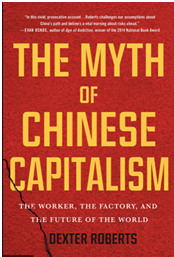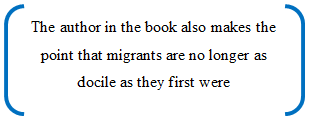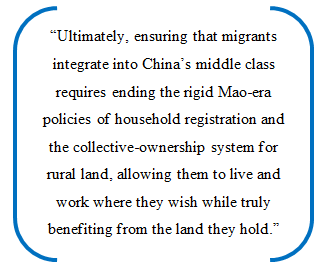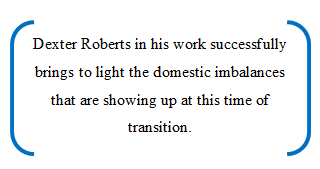Yash Johri, Research Assistant, ICS

“For years, China’s leaders have had an unspoken agreement with the people: they guarantee rising living standards, and, in turn, the populace tolerates control by a non-democratic and often unresponsive party… There are fatal problems with that equation today. Growing inequality means that a large proportion of the population decide that the party no longer is fulfilling its side of the bargain, and begin to demand changes.” (Pg. 179)
Dexter Roberts, Bloomberg Businesweek’s China Bureau Chief in his recently published book, The Myth of Chinese Capitalism (St. Martins Press, New York) investigates how these aforementioned problems came to pass. Having spent more than two decades in China and having reported from every province in the middle kingdom, Roberts’ analyses span from the heart of corporate Beijing and Shanghai to the dusty roads of the Guizhou hinterland. In the introduction he states that the guiding motives for his work “was to see how the party’s grand bargain was working for the Other China, of workers and farmers from lagging interior provinces – not the relatively well-off residents of its showcase coastal cities, where signs of material success were becoming increasingly apparent.” (Pg. XXIII) This holistic approach serves Roberts’ analysis of China well, especially at this moment in time. While in the early years of reform, China followed Deng Xiaoping’s trickle down economics formulation of the coastal areas becoming wealthy at first and a subsequent transfer of wealth to the rural inlands, there is now a targeted focus on programs such as ‘develop the west’ and the ‘rural vitalisation strategy’. Additionally, now that the Chinese economy has crossed its Lewis Turning Point[1] it faces the challenge of not only improving its total factory productivity with automation and a move to the digital world but more importantly in upgrading its social contract with migrant labour and rural persons upon whose toil the Chinese economic miracle has been built on so far.

From a political stability point of view, looking after the interests of migrant families who form a large portion of the Chinese middle class will be paramount. These persons now having lived in urban areas albeit without the benefits of urban residential status (Hukou) now desire further upward mobility within the cityscape, finding it difficult to go back to the village lifestyle. The author in the book also makes the point that migrants are no longer as docile as they first were, enough experience has been earned regarding their ability or inability to bargain for what they deem to be their due. There have also been a large number of persons who have returned home, largely spurred on by government schemes in order to rejuvenate the countryside in order to help China achieve higher levels of consumption required for it to reach its goal of becoming a moderately prosperous society. However the success of these schemes seems to be far from guaranteed as per Roberts.
Hukou – Household Registration System
The author views the continuance of this system as one of the biggest barriers to Chinese migrants joining the middle class and boosting consumption. This is because, only once citizens have an urban hukou can they avail benefits of state provided healthcare and education for them and their families. Given the higher costs to these vital services, most migrants leave behind their children in the villages or in state run boarding schools, earning these children the wintry moniker of ‘Left-Behind Children’, further for those who decide to migrate with their children non-aided private education is very expensive. This system was brought in to existence in 1958 before the Great Leap Forward to prevent internal migration among other reasons.

In the initial period of Gaige Kaifang (Reform and Opening Up) while internal migration was relaxed, the Hukou system remained. This situation has naturally created a large social and economic gulf in the cities and Roberts argues that even though the government recognises reforming this system as an important policy matter, one of the major constituencies against any reform are the well-entrenched urban residents themselves, unwilling to share already constrained resources. Other reasons are of course the high costs of accommodating this large population on the part of the various municipalities. The government is attempting numerous initiatives to address this issue, such as creating point systems to induct persons who meet the criterion for an urban hukou, granting hukou’s for Tier – 2 and Tier – 3 cities as well as large projects such as that of Xiong’an which aims to decongest Beijing of its various non-governmental functions and reduce pressures on the city’s own resources. However these efforts have translated into little positive change on the ground. Roberts, writes, “Ultimately, ensuring that migrants integrate into China’s middle class requires ending the rigid Mao-era policies of household registration and the collective-ownership system for rural land, allowing them to live and work where they wish while truly benefiting from the land they hold.” He goes on to state that the present government’s approach to increase restrictions as opposed to loosening them doesn’t really bode well for ending the Mao-era policies and integrating migrant labor into the Chinese Middle Class.
“Rural Vitalisation Strategy”
With the rising costs of manufacturing coupled with the state’s desire to maintain its status as factory to the world via automation, there has been a large reverse migration to the hinterland areas as well as the West. One of the major planks of Xi Jinping to successfully achieve the goals of the Made in China 2025 policy, decongest cities and rejuvenate rural spirits is the aforementioned rural vitalisation strategy which aspires to devolve property rights (in the form of 30 year leases) to migrants. In Beijing the repopulation of the hinterland has been seen in a positive light, that persons with urban experiences would energise the countryside with their gained know-how and skills. However one of the challenges Roberts highlights to the enforcement of these newly devolved property rights that would serve as a catalyst rural vitalisation are two fold:
1. Local Government and Real Estate Builder Nexus that ceases local land at low prices as has been illustrated by Roberts on Pg. 75-76 (Roberts further quotes a 2011 World Bank report that states that rural farmers have often lost their and been short-changed about $321 Billion); and
2. Continuing ideological commitment to land collectivisation, Xi Jinping at a speech in Xiaogang stated that the core of reform in the countryside is sticking to the collective ownership of rural land.
Therefore while the government often proposes policies to aid property rights in the hinterland, these two aforementioned factors act as countervailing pressures.

However eliminating absolute poverty is one of the paramount challenges faced by the incumbent government, and Guizhou being one of the most backward provinces has received a lot of political attention notes Roberts. Guizhou has in the recent past attracted a lot of investment as an important spot for data storage, numerous companies such as Apple, Qualcomm, Huawei, Tencent and Alibaba being investors. Additionally, given its natural beauty, the provincial and local governments along with companies and common citizens have made a bet on its tourism potential and have been building numerous hospitality retreats, from big five star resorts to small bed and breakfast places. However while the province has benefited from the hospitality industry in the recent past, numerous locals – some of whom have returned from urban areas and had plans to invest in the tourism industry – interviewed by Roberts in the village of Binghuacun continue to wait for the benefits to trickle down as well as demand for tourism arise.
China faces a number of challenges at this moment of transition, while its attempted shift to a technological superior society has catalysed the US-China trade war along with other related developments on the international front, domestic migrants who’ve not benefitted equally benefitted from China’s go-go years serve as a major challenge domestically. Dexter Roberts in his work successfully brings to light the domestic imbalances that are showing up at this time of transition, the disparities have only been accentuated by Covid – 19.
[1] The Lewis turning point is a situation in economic development where surplus rural labor is fully absorbed into the manufacturing sector. This typically causes agricultural and unskilled industrial real wages to rise. The term is named after economist W. Arthur Lewis.